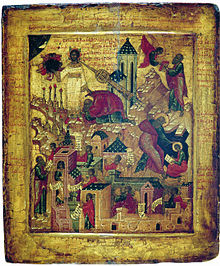This morning, I was reading in 3 Nephi 28 and came across the concluding verse, 40, where prophet-historian
Mormon describes the
translated status of the "
Three Nephites," who are previously discussed throughout the chapter:
And in this [translated] state they were to remain until the judgment day of Christ; and at that day they were to receive a greater change, and to be received into the kingdom of the Father to go no more out, but to dwell with God eternally in the heavens. 3 Nephi 28:40
Occasionally, I read certain phrases in the Book of Mormon that really stick with me, like
"the way of all the earth," which is used twice in the Old Testament, five times in the Book of Mormon, is preceded in each instance by some form of the verb "go," and refers to upcoming physical death. Consider this death-bed rejoinder from Lehi to his wayward sons in 2 Nephi 1, for example:
Awake! and arise from the dust, and hear the words of a trembling parent, whose limbs ye must soon lay down in the cold and silent grave, from whence no traveler can return; a few more days and I go the way of all the earth. 2 Nephi 1:14
Returning to what I read this morning, I seemed to remember hearing and reading, on occasion, the first bolded phrase: "go no more out." It's another one of those phrases I smile about and like to throw out, myself, every now and again. For example, perhaps after a long day I've quipped to my wife, "Honey, I'm heading home, to
go no more out."
So what does the phrase mean and why am I writing about it, other than because I think it sounds cool? Well, as with "[going] the way of all the earth," I'm convinced the phrase has a set meaning and context and gives strong circumstantial evidence of the Book of Mormon's veracity. First, as "going the way of all the earth" is invariably associated with an impending departure from mortality (which all men and creatures experience -- "
all the earth"), I believe "to go no more out" subtly refers to our pre-mortal existence with God (or Heavenly Father) and that, once
reunited with Him, those who receive this gift of permanent or
eternal reunion, which is
"the greatest of all the gifts of God," will forever retain it, always remain with Him, never leave Him, or "go no more out" from His presence, again (as we did by coming here, to earth).
When and how is the phrase
"go no more out" used in the Scriptures? It is found five times in the Book of Mormon and only twice in the Bible, once in the Old Testament (as a brief reference to war), and once in the New Testament. In Revelation, John writes the following about overcoming sins, trials, etc. and then
living with God:
Him that overcometh will I make a pillar in the temple of my God, and he shall go no more out: and I will write upon him the name of my God, and the name of the city of my God, which is new Jerusalem, which cometh down out of heaven from my God: and I will write upon him my new name. Revelation 3:12
 |
| Visual of scenes from the book of Revelation. |
Members of
The Church of Jesus Christ of Latter-day Saints (or "Mormons") often refer to the temple as "God's house" or dwelling, such as is indicated on
Latter-day Saint temples, "Holiness to the LORD, the
House of the LORD" and referenced by the Lord, Himself: "And [He] said unto them that sold doves, Take these things hence; make not my Father’s house [the Jerusalem temple] an house of merchandise."
John 2:16
 |
| The temple - a recurring symbol of God's "house" and "kingdom." |
Members of the Church and, I believe I can accurately state, believers in a Muslim-Judeo-Christian God everywhere, all refer to him as "King." Where does a king
dwell but in his
house (or castle)? Thus, the temple (which John references in Revelation) or house of God is an appropriate symbol for His dwelling, castle, and
kingdom. Unsurprisingly, the phrase "go no more out," as employed in the five distinct instances in the Book of Mormon, is always connected with God's "kingdom," which is also, as discussed, where he lives and dwells. (Use
this link for a quick overview of the five verses.) Thus, once we
return to live with God, if eligible, we will then, again, live with Him forever or "eternally," to "go no more out," as we did upon leaving His presence to come to earth.
Finally, as I set out previously (and as I have made similar submissions, in the past), I view this textual and substantive correlation to Revelation, the unique nature and consistency of the phrase, its invariable meaning (as I interpret it), and its scattering throughout the Book of Mormon as strong circumstantial evidence Joseph Smith
translated a book of Scripture, revealed by God, rather than fabricating the work out of whole cloth. The phrase "go no more out" is used twice by
Alma, once by
Amulek, and twice by
Mormon, all sprinkled across 237 pages of text (pg. 226 - 463 in my hard copy of the Book of Mormon).
 |
| The plates of the Book of Mormon and other objects Joseph Smith found with them. |
Many reject Joseph Smith's story of receiving and
translating the Book of Mormon as too fantastical or whimsical. They insist he or someone else authored the book and that his claims of receiving plates of gold, containing the scriptures he translated, are raving or, worse, fraudulent. Given my experience of the Book of Mormon's power and immense textual richness, I conclude, by echoing the words of
Elder Jeffery R. Holland (a modern-day Apostle): "[T]hat any writer—Joseph Smith or anyone else—could create the Book of Mormon out of whole cloth would be an infinitely greater miracle than that young Joseph translated it from an ancient record ‘by the gift and power of God.’” Jeffrey R. Holland, Christ and the New Covenant (Salt Lake City: Deseret Book, 1997), 349. (I also highly recommend these two talks (or sermons) by Elder Holland, relating to the Book of Mormon:
Safety for the Soul and
My Words Never Cease.)
Let me add my personal witness that the Book of Mormon is true. Beyond mere neat or intriguing textual richness, I have received a witness of its truthfulness by the power of the Holy Spirit and know it is the word of God. My ultimate purpose for writing this post is to inform you that you, also, can know this truth for yourself (see
Moroni 10:3-5).










